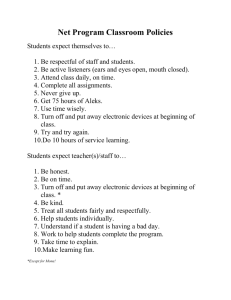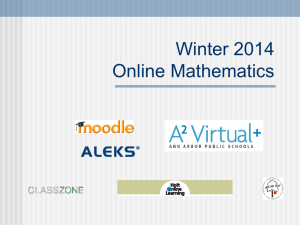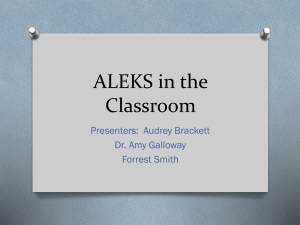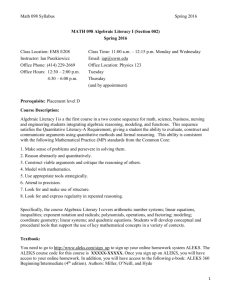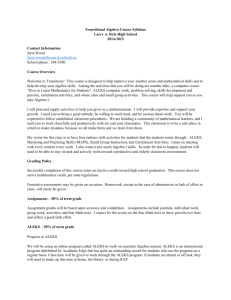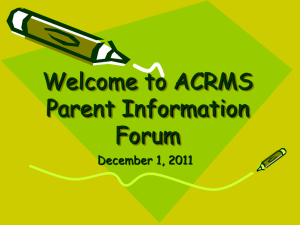aleks
advertisement
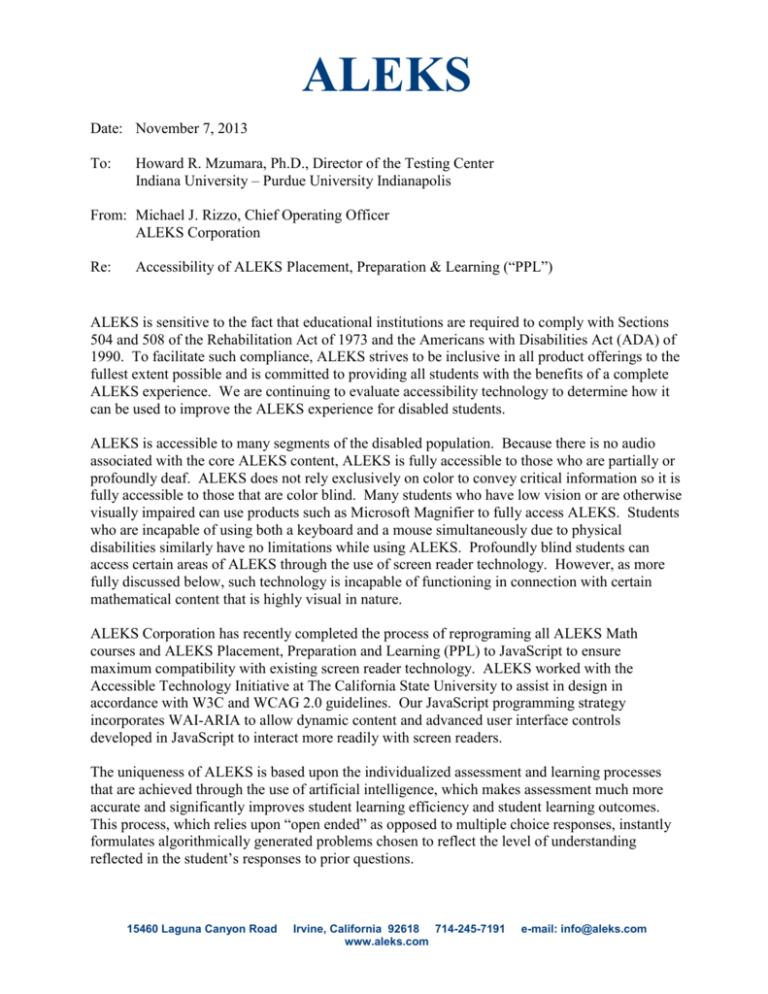
ALEKS Date: November 7, 2013 To: Howard R. Mzumara, Ph.D., Director of the Testing Center Indiana University – Purdue University Indianapolis From: Michael J. Rizzo, Chief Operating Officer ALEKS Corporation Re: Accessibility of ALEKS Placement, Preparation & Learning (“PPL”) ALEKS is sensitive to the fact that educational institutions are required to comply with Sections 504 and 508 of the Rehabilitation Act of 1973 and the Americans with Disabilities Act (ADA) of 1990. To facilitate such compliance, ALEKS strives to be inclusive in all product offerings to the fullest extent possible and is committed to providing all students with the benefits of a complete ALEKS experience. We are continuing to evaluate accessibility technology to determine how it can be used to improve the ALEKS experience for disabled students. ALEKS is accessible to many segments of the disabled population. Because there is no audio associated with the core ALEKS content, ALEKS is fully accessible to those who are partially or profoundly deaf. ALEKS does not rely exclusively on color to convey critical information so it is fully accessible to those that are color blind. Many students who have low vision or are otherwise visually impaired can use products such as Microsoft Magnifier to fully access ALEKS. Students who are incapable of using both a keyboard and a mouse simultaneously due to physical disabilities similarly have no limitations while using ALEKS. Profoundly blind students can access certain areas of ALEKS through the use of screen reader technology. However, as more fully discussed below, such technology is incapable of functioning in connection with certain mathematical content that is highly visual in nature. ALEKS Corporation has recently completed the process of reprograming all ALEKS Math courses and ALEKS Placement, Preparation and Learning (PPL) to JavaScript to ensure maximum compatibility with existing screen reader technology. ALEKS worked with the Accessible Technology Initiative at The California State University to assist in design in accordance with W3C and WCAG 2.0 guidelines. Our JavaScript programming strategy incorporates WAI-ARIA to allow dynamic content and advanced user interface controls developed in JavaScript to interact more readily with screen readers. The uniqueness of ALEKS is based upon the individualized assessment and learning processes that are achieved through the use of artificial intelligence, which makes assessment much more accurate and significantly improves student learning efficiency and student learning outcomes. This process, which relies upon “open ended” as opposed to multiple choice responses, instantly formulates algorithmically generated problems chosen to reflect the level of understanding reflected in the student’s responses to prior questions. 15460 Laguna Canyon Road Irvine, California 92618 714-245-7191 www.aleks.com e-mail: info@aleks.com Page 2 of 3 Certain open ended responses in the PPL assessment require the student to use input tools that interact with visually complex materials, such as Cartesian coordinate graphs, that are not currently usable by the profoundly blind. Technologies to effectively make such visually demanding input tools in ALEKS usable by the profoundly blind may become available as the technology in this area continues to evolve. However, making major changes to the current PPL assessment would fundamentally alter its nature and functionality. For instance, were ALEKS to be reprogrammed to employ multiple choice questions for visually demanding material, the adverse impact on assessment accuracy would significantly reduce the effectiveness of ALEKS. Multiple-choice questions are poor tools for measuring the ability to solve quantitative problems, or to synthesize and evaluate information or apply knowledge to complex constructs. Quantitative problem-solving and higher-order reasoning skills are far better assessed through free response tests, which evaluate the student’s actual mastery of the question and eliminate statistical “noise” from assessments of knowledge. In attempting to address the needs of students with limited vision and the needs of profoundly blind students, we have evaluated current screen reader technology and have determined it to be unsatisfactory with regard to problems which are visually demanding. While we believe that input tools will be fully accessible for the majority of problem types, we recognize the need to continue to research, develop and implement accessible input tools in regard to open-ended problems for which answers can be entered in free response form while reducing the extent to which such input tools are visually demanding. Mathematics courses as early as Pre-Algebra are highly visual. Math textbooks and software naturally contain vast amounts of Mathematical notation, graphs, and other forms of diagrams and pictures that are visual in nature. For many topics, the understanding derived through visualizing the Mathematical concepts involved cannot be replicated easily, if at all, by available screen reader technology. This problem is faced by all providers of online content in those subjects. Those that claim that all of their online Math content is fully compliant with the ADA, Section 504 or Section 508 are likely exaggerating their capabilities in this regard. The validity of such claims, therefore, should be thoroughly tested. To assist a profoundly blind student, it is most effective to convert these images into a raised form – a tactile diagram – that can be interpreted by touch. Using Alt Tags to describe complex graphs is a poor substitute for visualization or tactile diagrams. Even a highly detailed verbal description of a complex graph without tactile supplementation is unlikely to achieve the intended learning goal. Modification of Math courses to eliminate these elements would adversely impact the intended learning outcomes of those courses. As a result, ALEKS believes that such a modification would fundamentally alter the core functionality of these courses. Given the current state of assistive technology, many colleges and universities that have addressed the issue of teaching Mathematics to profoundly blind students have determined that an “alternative accessible arrangement” in the form of human assistance (qualified readers or transcribers to record answers) is the best accommodation for those students as they work through either a traditional Math curriculum and textbook or as they work with ALEKS. This approach is also consistent with their approach to other visually demanding course work. 15460 Laguna Canyon Road Irvine, California 92618 714-245-7191 www.aleks.com e-mail: info@aleks.com Page 3 of 3 Given the adaptive, personalized, open response format of the PPL assessment, one possible accommodation for blind students would be to have a human helper available to the student by phone as the student takes the PPL assessment. The helper would log into ALEKS using the student’s login name and password. The helper would be instructed to read each question to the student and would input the student’s answers into ALEKS. The helper would also describe to the student the content of graphing problems and would record the student’s responses. Since there is no time limit for the PPL assessment, the student would not be disadvantaged in that regard. With this assistance, the student could complete the assessment in a manner substantially equivalent to sighted students. We recognize that educational institutions must provide accommodations or modifications that would permit disabled students to receive all the educational benefits provided by the ALEKS technology in an equally effective and equally integrated manner. We are committed to broadening the accessibility of ALEKS and continuing to evaluate accessibility technology to determine how it can be used to improve the ALEKS experience for disabled students. We look forward to keeping you informed about our progress as we pursue our goal of creating courses that present advanced and visually demanding concepts such as graphing in a manner that is accessible and beneficial to blind and extremely visually impaired students. 15460 Laguna Canyon Road Irvine, California 92618 714-245-7191 www.aleks.com e-mail: info@aleks.com
